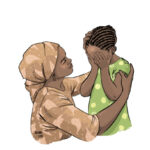Africa’s peaceful parenting coach, Abimbola Olayinka has said that the pathway to raising a responsible, peaceful, empathetic, compassionate and value-inclined child is to parent with peace.
She noted that when parents are at peace, it would be easier to transfer that state of peace to their family climate which peaceful parenting seeks to fulfil, bearing in mind that the home is the production house of the society.
According to the certified coach from the Academy of parenting coaches from Corte Portino Menifee and Emotional Intelligence specialist, “the framework of peaceful parenting thrives on believing that parenting challenges can be worked through using non-punitive measures. This model focuses on establishing and strengthening the emotional bonds between a parent or caregiver and the child.
“It is believed that a child’s behaviour is a product of care and affection a child receives; experiences a child witnesses; measures by which a child is corrected or taught, and a parent’s awareness of the child’s emotional needs.”
- Society to train, lift 40,000 women from poverty
- Public health professionals working on post-COVID-19 reform — Society
Peaceful parenting is particular about teaching parents the necessity of emotional intelligence, a structure for improving self-awareness and self-regulation. While the former reveals how emotions direct our decisions and actions, and the effects of these on our children, self-regulation suggests ways to maintain control of oneself – especially when tensions are high.
Olayinka who is also the founder of Galparenting place and Peaceful parenting hub, stressed that a child nurtured in an ecosystem where peaceful parenting thrives, learns to communicate his needs. The child understands that emotions and desires are valid, and that conflicts do not necessarily generate outbursts. Contrary to the traditional parenting method – which believes that punishing a child or intentionally inflicting pain on a child drives home a lesson – the peaceful parenting approach adopts punishment-free principles. The peaceful parent conceives a healthy, positive family spirit and commits to it.
“Consider, too, that Emotional Intelligence triggers changes within those who engage it. With the parent-child party committed to honesty, mutual understanding, and respect, the value they set on human interaction grows. The society, which tilts towards misdemeanours and offences, does so because human interaction is undervalued, and because the individuals existing in that society struggle to appreciate the gift of one another.
“Peaceful parenting, however, prioritises the human experience, the human behaviour, and the human emotion, thus making it a perfect tool for sustaining societal sanity.”
The positive psychology practitioner noted that a Yoruba adage loosely translates thus, ‘The child from yesterday has become the adult today.’ We can recall, too, the line from a rhyme that says, ‘Parents, listen to your children; they are the leaders of tomorrow.’
The society is a constantly growing scheme. Those who witness it as children soon become the forerunners of the society. No adult skips the childhood experience; thus the childhood of any individual greatly directs the course of their adulthood.

 Join Daily Trust WhatsApp Community For Quick Access To News and Happenings Around You.
Join Daily Trust WhatsApp Community For Quick Access To News and Happenings Around You.


